The Bundeswehr as an Army on Operations
Threats do not respect national borders. This is why the Bundeswehr is now deployed worldwide.
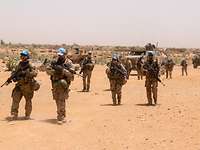


Threats do not respect national borders. This is why the Bundeswehr is now deployed worldwide.

Until German reunification in 1990, the Bundeswehr’s mission was national and collective defence. The Bundeswehr only participated in operations outside of NATONorth Atlantic Treaty Organization territory in the event of natural disasters. For example, German transport aviation personnel and military engineers often provided drought and earthquake assistance or transported relief supplies into disaster areas.
In this way, Bundeswehr personnel have been deployed abroad in more than 50 countries since 1959. However, until 1990, many soldiers also saw their work in the NATONorth Atlantic Treaty Organization air defence operations centres or on exercises as an operation. The Bundeswehr had not yet participated in the United Nations’ peacekeeping missions at that time.
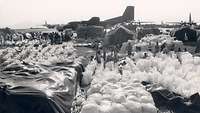
Providing assistance during a drought in Africa: in August 1986, a Bundeswehr Transall delivered relief supplies to Mozambique.
Bundeswehr/HoffmannHowever, after German reunification, it became clear that Germany would have to take on a more active role in fulfilling its obligations from international treaties. In this context, Federal Chancellor Helmut Kohl had already declared in his government policy statement in the first reunified German Bundestag on 4 October 1990 that reunified Germany would fulfil its international responsibilities and that the necessary constitutional basis would be established.
In 1991, during the Gulf War to liberate Kuwait, which was occupied by Iraq, the Bundeswehr dispatched fighter bombers and surface-to-air missiles to Turkey and a mine countermeasures force to the Mediterranean Sea. The goal was primarily to make its presence felt on NATONorth Atlantic Treaty Organization’s southern flank and demonstrate its solidarity with Turkey as a NATONorth Atlantic Treaty Organization partner.
In addition, Germany provided materiel support for the United Nations’ coalition forces and surface-to-air missiles for Israel. Germany’s support amounted to about eleven billion Deutschmarks (about five billion euros). After the war, a Bundeswehr minesweeping unit helped remove mines from the Persian Gulf.
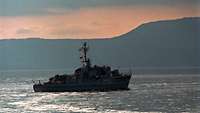
The goal of Operation Südflanke (“southern flank”) was to demonstrate solidarity with Turkey as a NATONorth Atlantic Treaty Organization partner in 1991 during the Gulf War.
Bundeswehr/GatzmangaThe Bundeswehr’s first operation “out of area”, that is, outside of NATONorth Atlantic Treaty Organization territory, was in Cambodia. In 1992 and 1993, German medics were assigned to provide medical care for the UNUnited Nations peacekeeping forces with a hospital in the Cambodian capital Phnom Penh. Since they still had a great deal of free capacity, they also provided medical care for the local population.
On this operation, Sergeant Alexander Arndt was shot by an unknown assailant, making him the Federal Republic of Germany’s first soldier to be killed on a deployment abroad.
From 1993 to 1995, German military personnel supported the United Nations Operation in Somalia II (UNOSOMUnited Nations Operation in Somalia II) with a combined-arms combat service support battalion. Their objective was to provide supplies and services to an Indian brigade of UNUnited Nations peacekeeping forces in the north of the country. However, because this brigade was not employed, the German military personnel provided reconstruction aid to the local population instead.
The United Nations mandated the operations in Cambodia and Somalia within the framework of resolutions by the UNUnited Nations Security Council. They were considered peacekeeping missions. The UNUnited Nations mandate and the decision by the German Federal Cabinet were sufficient for the humanitarian aid operation in Cambodia.
While there was also a UNUnited Nations mandate for the mission in Somalia, the initial situation for deployment of German personnel there was different. Unlike in Cambodia, it was not a humanitarian operation, but rather a military mission and therefore unconstitutional. In response to a request by the SPDSozialdemokratische Partei Deutschlands opposition party, the Federal Constitutional Court stated in its judgment of 23 June 1993 that sending military personnel to Somalia required the approval of the German Bundestag. The German Bundestag then gave its approval in early July 1993.
The fundamental question regarding the constitutionality of operations abroad outside of NATONorth Atlantic Treaty Organization territory was not resolved until a year later, in the “out-of-area decision” of 12 July 1994. This judgment states that out-of-area missions are constitutional if the German Bundestag approves them in advance. It gave rise to what is known as the “parliamentary reservation”.
The conflict in the disintegrating Yugoslavia, which had been escalating since 1990, presented a dilemma for Germany’s foreign policy. By quickly recognising the independence of Slovenia and Croatia in December 1991, Germany had exacerbated these countries’ conflict with the rest of Yugoslavia. One year later, Bosnia and Herzegovina’s independence brought with it the next flare-up, this time in the form of an ethnic conflict between Bosnian Muslims and Serbs. The United Nations failed to intervene for quite some time. The United Nations Protection Force (UNPROFORUnited Nations Protection Force) was unable to diffuse the conflict, and its troops did not have a mandate to take action against the acts of ethnic cleansing committed by the Bosnian Serbs.
In 1992, the Federal Republic of Germany offered to support UNPROFORUnited Nations Protection Force with a logistics base in Croatia, as well as reconnaissance aircraft. Later, the Bundeswehr also helped monitor an embargo with ships in the Mediterranean Sea (UNUnited Nations Operation Sharp Guard). However, even no-fly zones could not bring peace to the conflict.

The Implementation Force (IFORImplementation Force) in Bosnia and Herzegovina also regulated the traffic near Tomislavgrad.
Bundeswehr/Detmar ModesIn December 1995, European countries and the USUnited States forced the warring parties to accept peace in Bosnia and Herzegovina under the Dayton Peace Agreement. The United Nations then sent the Implementation Force (IFORImplementation Force) to monitor implementation of the agreement. The Bundeswehr contributed an Army contingent to provide supplies and services to the participating armed forces, and monitored the no-fly zone with Tornado ECRElectronic Combat Reconnaissance and reconnaissance aircraft.
The Air Force’s supply flights to Sarajevo, which was under siege by the Bosnian Serbs, were far more dangerous. From July 1992 to June 1996, German transport aircraft brought supplies, food and medicine to the city in an airlift.
Participation in the operations in the Balkans led to repeated clashes between the parties represented in the German Bundestag. Until summer 1994, the German government stated that participation in these operations was always also of a humanitarian nature, so it would not be appropriate for Germany to stand by and do nothing.
In order to clarify whether these operations were compatible with the Basic Law for the Federal Republic of Germany, the SPDSozialdemokratische Partei Deutschlands and FDPFreie Demokratische Partei parliamentary groups in the German Bundestag turned to the Federal Constitutional Court. The SPDSozialdemokratische Partei Deutschlands thought that even the Sharp Guard and UNOSOMUnited Nations Operation in Somalia operations had been unconstitutional, while the FDPFreie Demokratische Partei considered the participation of German military personnel in the AEW&C surveillance flights over the Balkans unconstitutional.
On 12 July 1994 in Karlsruhe, the Federal Constitutional Court issued its judgment that the Basic Law permits the Bundeswehr to be deployed even outside of NATONorth Atlantic Treaty Organization territory (“out of area”) because Article 24(2) states that: “With a view to maintaining peace, the Federation may enter into a system of mutual collective security”. According to the Federal Constitutional Court, this provision applies to both NATONorth Atlantic Treaty Organization and the United Nations. As a member of the United Nations, Germany is also obliged to provide military support to mandated missions in accordance with Chapter VII of the Charter of the United Nations. This meant that the Bundeswehr’s operations had been compatible with the Basic Law all along.
However, the Federal Constitutional Court required that the German federal government have the German Bundestag make decisions on whether to deploy the Bundeswehr on a given operation.

The Parliamentary Participation Act stipulates that the German Bundestag make final decisions regarding the Bundeswehr’s operations abroad.
Bundeswehr/Andreas NollThe Parliamentary Participation Act, which went into effect in 2005, defines this procedure. Whether before or after 1994, the Basic Law is still the deciding factor for the Bundeswehr’s operations abroad. However, the judgment in Karlsruhe gave the German Bundestag an essential right to participation in this process.
The Bundeswehr’s various operations in the Balkans lasted until 2017. Majorities in the German Bundestag always supported them. The Kosovo War starting in March 1999 was the exception. The ethnic conflict between Orthodox Christian Serbs and primarily Muslim Kosovo Albanians had also escalated there. The Federal Republic of Yugoslavia was increasingly restricting the autonomy of its province Kosovo. As a result of this political control, Kosovo’s Muslim majority, which was also pursuing its own independence, made efforts to separate from the Federal Republic of Yugoslavia. The domestic tensions increased due to police and military repression of the population, which resulted in the formation of paramilitary Kosovo Albanian associations that also committed acts of violence against Serbs.
Due to the continuing escalation by Yugoslav leadership, the Western countries decided in March 1999 to conduct an air campaign against Yugoslavia and its forces in Kosovo in order to force it to back down. In this campaign, the Bundeswehr fought against Yugoslavia’s air defence, primarily with Tornado ECRElectronic Combat Reconnaissance aircraft. It was the first combat mission for the army on operations, but it had not been mandated by the United Nations.
Only after four months did this campaign end with the capitulation of the Yugoslav government. The Bundeswehr sent troops within the framework of the Kosovo Force (KFORKosovo Force) to secure the peace process. In 2008, Kosovo declared its political independence from Yugoslavia.
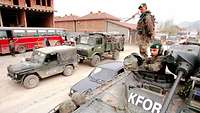
Bundeswehr soldiers in the Kosovo Force (KFORKosovo Force) check vehicles and people entering Prizren for weapons. A Marder armoured infantry fighting vehicle protects the checkpoint.
Bundeswehr/Detmar ModesOn 11 September 2001, Islamist terrorists attacked the World Trade Center in New York and the USUnited States Department of Defense near Washington, D.C.District of Columbia with four hijacked passenger planes. Thousands were killed. USUnited States President George W. Bush declared the “war on terror” and on the al-Qaeda network. This network had previously carried out terrorist attacks on USUnited States facilities in other locations and claimed responsibility for the 9/11 attacks.
In the German Bundestag a few days later, Federal Chancellor Gerhard Schröder expressed Germany’s “unlimited solidarity” with the United States. For the first time in its history, NATONorth Atlantic Treaty Organization invoked the Article 5 mutual defence clause of the North Atlantic Treaty. Afghanistan, al-Qaeda’s central safe haven, was neither willing nor able to hand over those who had orchestrated the attacks.
Accordingly, the United Nations Security Council decided to deploy an International Security Assistance Force (ISAFInternational Security Assistance Force). It was intended to provide protection to allow the development of governmental structures in Afghanistan. At that point, large parts of the country were under Taliban rule. In fact, ISAFInternational Security Assistance Force initially succeeded in pushing back against the Taliban’s influence and supporting the newly established central government and the parliament. The Bundeswehr participated in ISAFInternational Security Assistance Force starting in February 2002, providing parts of the Multinational Brigade in Kabul and operating Kabul International Airport. Later, it was moved to the north, where it took on responsibility for Regional Command North and the stability operation there.
In the beginning, the operations in Afghanistan were stabilisation missions like the earlier missions in the Balkans. They were intended to secure peace processes, develop governmental structures and promote the development of essential infrastructure. However, this “stabilisation mission” in Afghanistan was under pressure from the beginning. The Taliban’s armed groups, which initially seemed to have been expelled, fought increasingly fiercely against ISAFInternational Security Assistance Force, which they saw as an intruder. There were a growing number of attacks on ISAFInternational Security Assistance Force military personnel. Starting in 2008, overt attacks were also carried out in Germany’s area of responsibility.
German military personnel experienced the increasing combat action as a “war”, while politicians continued to call it a “stabilisation mission”. Perceptions of the reality in Afghanistan were divided.
In late 2009, Federal Minister of Defence Karl-Theodor zu Guttenberg was the first to refer to “war-like conditions” in Afghanistan. After the combat action in 2010, he called the mission a “war”. Only under the pressure of these assessments were the Bundeswehr leadership and the German government willing to send heavy weapons such as howitzers and armoured infantry fighting vehicles to Afghanistan.
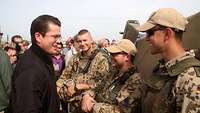
Federal Minister of Defence Karl-Theodor zu Guttenberg speaks with Bundeswehr soldiers during an April 2010 visit to PRTProvincial Reconstruction Team Kunduz in Afghanistan.
BundeswehrThe ISAFInternational Security Assistance Force mission ended in 2014. It was followed by Resolute Support, which was solely an advisory mission. By then, 35 German military personnel had been killed in combat action or attacks in Afghanistan. As an army on operations, the Bundeswehr has lost more than 100 military personnel since 1991. The Forest of Remembrance near Potsdam commemorates those who lost their lives.
In 2004, Peter Struck, then Federal Minister of Defence, stated that: “Our security is also being defended in the Hindu Kush”. This means that we have to combat international terrorism at its roots. At the same time, because Germany depends on free trade and open trade routes, it must also be ready to defend these freedoms.
The Bundeswehr is currently also active in Mali, where German military personnel are stabilising the region and working with military personnel from other countries to train the Malian armed forces so they can protect their homeland. At the moment, the Bundeswehr is participating in twelve operations from Western Sahara to the Horn of Africa. The army on operations has become a reality.
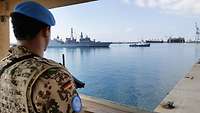
A guard in the German UNIFILUnited Nations Interim Force in Lebanon contingent watches from a guard tower as Frigate Augsburg F213 enters into the port of Limassol, Cyprus.
Bundeswehr/Sascha JonackThe international order has become more complex since the end of the East-West conflict. Terrorist groups that operate internationally, regional warlords, and international arms and drug trafficking jeopardise the security and stability of many regions around the world. Unlike regional conflicts such as those in the Balkans, today’s conflicts often spread across borders and involve many different actors.
The Federal Republic of Germany is also a leading European power. Other countries are dependent on its economy. This means that Germany cannot refuse its international responsibility. It must be prepared to take action within the framework of international agreements and treaties in the interest of peacekeeping and containment of conflicts and wars.
Schlaffer, Rudolf J. and Sandig, Marina, Die Bundeswehr 1955 – 2015. Sicherheitspolitik und Streitkräfte in der Demokratie. Analysen, Bilder und Übersichten [The Bundeswehr from 1955 – 2015. Security policy and armed forces in a democracy. Analyses, images and overviews]. Freiburg im Breisgau 2015, ISBN 978-3-7930-9836-2